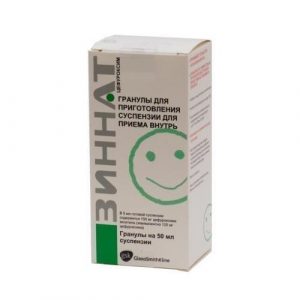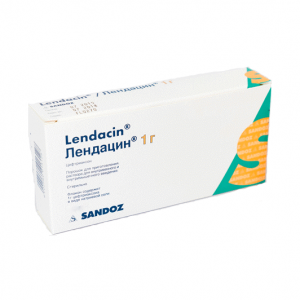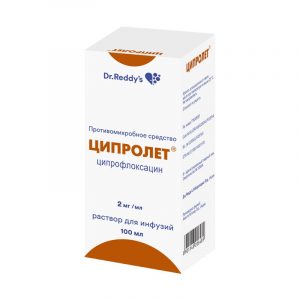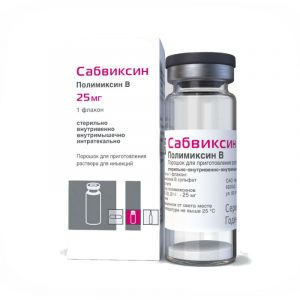Description
Release form
Dispersible tablets
Packing
20 pcs.
Pharmacological action
The broad-spectrum penicillin antibiotic contains semisynthetic penicillin amoxicillin and a b-lactamase clavulanic acid inhibitor.
Amoxicillin acts bactericidal, inhibits cell wall synthesis. Clavulanic acid inhibits most clinically significant b-lactamases (types II, III, IV, and V according to the Richmond-Sykes classification).
Inactive against type I b-lactamases produced by Enterobacter spp., Pseudomonas aeruginosa, Serratia spp., Acinetobacter spp. Clavulanic acid forms a stable inactivated complex with these enzymes, which prevents the enzymatic degradation of amoxicillin under the influence of b-lactamases and expands its spectrum of action.
Flemoklav Solutab is active against both amoxicillin-sensitive strains, and in relation to strains producing b-lactamases.
Flemoklav Solutab is active against aerobic gram-positive bacteria: Streptococcus pneumoniae, Streptococcus viridans, Streptococcus pyogenes, Staphylococcus aureus (including strains producing b-lactamases), Staphylococcus epidermidis, including strains of spercococcus bacilli, bacillus bacteria, Bacillus anthracis, Listeria monocytogenes of anaerobic gram-positive bacteria: Clostridium spp., Peptostreptococcus spp., Peptococcus spp. aerobic gram-negative bacteria: Escherichia coli, Klebsiella spp., Proteus mirabilis, Proteus vulgaris, Yersinia enterocolitica, Salmonella spp., Shigella spp., Haemophilus influenzae, Haemophilus ducreyi, Neisseria gonorrhoeae (including lactobacilli bacteria) Neisseria meningitidis, Bordetella pertussis, Gardnerella vaginalis, Brucella spp., Branhamella catarralis, Pasteurela multocida, Campylobacter jejuni, Vibrio cholerae, Moraxella catarrhalis, bacterobacterides, bacteriobacterides, bacteriobacterides, bacterides. .
Indications
Infectious and inflammatory diseases caused by microorganisms sensitive to the drug: – upper respiratory tract infections and ENT organs (including otitis media, sinusitis, tonsillitis, pharyngitis)
– lower respiratory tract infections (chronic bronchitis and its aggravation community-acquired pneumonia)
– infections of the skin and soft tissues
– infections of the kidneys and urinary tract
– infections of the genital organs.
Contraindications
– impaired liver function (including jaundice) when taking amoxicillin / clavulanic acid in the history of
– infectious mononucleosis or lymphocytic leukemia (risk of exanthema)
– children under 2 years of age (for this dosage form – s) hypersensitivity to other beta-lactam antibiotics, such as penicillins and cephalosporins
– hypersensitivity to amoxicillin, clavulanic acid and other components of the drug.
With caution, the drug should be prescribed for severe liver failure, chronic renal failure, gastrointestinal diseases (including colitis associated with the use of penicillins, in history).
Use during pregnancy and lactation
When using Flemoklav Solutab during pregnancy, its negative effect on the fetus or newborn was not noted. The use of the drug in the II and III trimester of pregnancy is considered safe. In the first trimester of pregnancy, Flemoklav Solutab should be used with caution.
Amoxicillin is excreted in breast milk. There is no data on the excretion of clavulanic acid with breast milk.
There were no adverse effects on the baby during breastfeeding while taking Flemoklav Solutab.
Special instructions
If anaphylactic reactions develop in response to Flemoklav Solutab, the drug should be stopped immediately and appropriate therapy should be given (administration of epinephrine / adrenaline /, corticosteroids, elimination of respiratory failure).
When taking Flemoklav Solutab, there is the possibility of cross-resistance and increased sensitivity with other penicillins or cephalosporins.
Perhaps the development of superinfection (in particular, candidiasis) due to the growth of microflora insensitive to the drug, especially in patients with chronic diseases and / or impaired immune system function. In case of superinfection, the drug is canceled and / or antibiotic therapy is changed accordingly.
In case of impaired liver function, the drug should be prescribed with caution and under constant medical supervision. The drug should not be used for more than 14 days without an assessment of liver function.
An increase in prothrombin time may be noted while taking the drug. Therefore, Flemoklav Solutab should be prescribed with caution to patients receiving anticoagulant therapy (it is necessary to monitor blood coagulation).
Amoxicillin should not be prescribed with disulfiram.
During the application of Flemoklav Solutab, non-enzymatic methods for the determination of glucose in urine, as well as a test for urobilinogen can give false positive results.
During the course of treatment, it is necessary to monitor the state of the function of the blood, liver and kidneys.
Composition
1 tablet contains
amoxicillin trihydrate 500 mg
clavulanate potassium 125 mg
Dosage and administration of
Adults and children over 12 years of age (weighing more than 40 kg) are prescribed 1 tab. 500/125 mg 3 times / day. In severe, chronic, recurrent infections, this dose can be doubled.
For children aged 2 to 12 years (weighing approximately 13-37 kg), the daily dose is 20-30 mg of amoxicillin and 5-7.5 mg of clavulanic acid per kg of body weight. On average, this amounts to a dose of 125 / 31.25 mg 3 times / day for children aged 2 to 7 years (body weight about 13-25 kg) and 250/62. 5 mg 3 times / day for children aged 7 to 12 years (body weight about 25-37 kg).
In severe infections, this dose can be doubled. The maximum daily dose is 60 mg of amoxicillin and 15 mg of clavulanic acid per kg of body weight.
The duration of treatment depends on the severity of the infection and is 5-14 days.
Treatment should not be continued for more than 14 days without a second medical examination, as the risk of side effects increases when taking the drug for more than 14 days.
Side effects
Allergic reactions: often – urticaria, erythematous rashes rarely – multiforme exudative erythema in rare cases – exfoliative dermatitis, malignant exudative erythema (Stevens-Johnson syndrome), anaphylactic shock, angiopathic shock, angiitis. In some cases, a so-called rash n erythematous rashes rarely – multiforme exudative erythema in rare cases – exfoliative dermatitis, malignant exudative erythema (Stevens-Johnson syndrome), anaphylactic shock, angioedema. In some cases, a so-called rash n erythematous rashes rarely – multiforme exudative erythema in rare cases – exfoliative dermatitis, malignant exudative erythema (Stevens-Johnson syndrome), anaphylactic shock, angioedema. In some cases, a so-called rash nthe same day (measles exanthema).
From the digestive system: often – nausea, vomiting, diarrhea, abdominal pain, impaired liver function, increased activity of hepatic transaminases rarely – hepatitis, cholestatic jaundice in isolated cases – pseudomembranous colitis. An increase in the activity of transaminases (ACT and ALT), bilirubin and alkaline phosphatase is usually observed in males and in elderly patients, especially over 65 years of age. These phenomena are very rarely observed in children. The above changes usually appear during treatment or immediately after. Sometimes they may appear a few weeks after discontinuation of the drug. Basically, reactions from the digestive system are transient and insignificant, but sometimes they are pronounced.
From the hemopoietic system: rarely – leukopenia, thrombocytopenia, hemolytic anemia.
Other: candidiasis, the development of superinfection, exanthema rarely – a reversible increase in prothrombin time, interstitial nephritis, vasculitis.
Drug Interactions
When used simultaneously with Flemoklav Solutab antacids, glucosamine, laxatives, aminoglycosides slow down and reduce the absorption of the active components of the drug ascorbic acid – increases.
When used simultaneously with Flemoklav Solutab, bactericidal antibiotics (including aminoglycosides, cephalosporins, cycloserine, vancomycin, rifampicin) exhibit a synergistic interaction between bacteriostatic drugs (macrolides, chloramphenicol, lincosamides, tetracyclines, sulfanilamides).
With the simultaneous use of Flemoklav Solutab increases the effectiveness of indirect anticoagulants by suppressing intestinal microflora, reducing the synthesis of vitamin K and prothrombin index.
Flemoklav Solutab with simultaneous use reduces the effectiveness of oral contraceptives, drugs in the metabolism of which PABA is formed, ethinyl estradiol (risk of acyclic bleeding).
Diuretics, allopurinol, phenylbutazone, NSAIDs and other drugs that block tubular secretion, while using Flemoklav Solutab, increase the concentration of amoxicillin (clavulanic acid is excreted mainly by glomerular filtration).
The simultaneous use of Flemoklav Solutab with allopurinol increases the risk of skin rash.
The simultaneous use of amoxicillin and digoxin can lead to an increase in the concentration of digoxin in blood plasma.
Overdose
Symptoms: nausea, vomiting, diarrhea with possible impaired water and electrolyte balance.
Treatment: appoint activated charcoal, it is necessary to maintain water and electrolyte balance, conduct symptomatic therapy, with convulsions appoint diazepam, with renal insufficiency severe hemodialysis.
Storage conditions
The product should be stored out of the reach of children at temperatures below 25 ° C.
Active ingredient
Amoxicillin, Clavulanic Ki slots
lekarstvennaja form
pills for resorption
Prescribing
Pregnant as prescribed by a doctor, Adults prescribed by a doctor, Nursing mothers, As prescribed by a doctor
Indications
Indications srdlkt Otitis, From rd th urinary tract, from otitis media, from cholecystitis, from periodontitis, from skin infections, a sore throat, from tonsillitis, from respiratory infections, from osteomyelitis, from pharyngitis, From pneumonia




